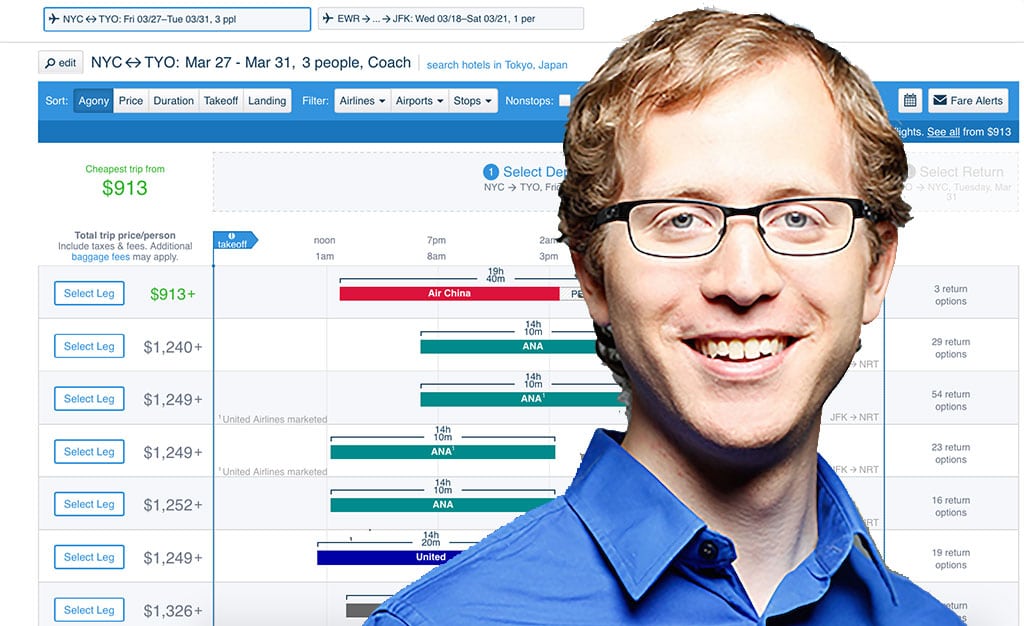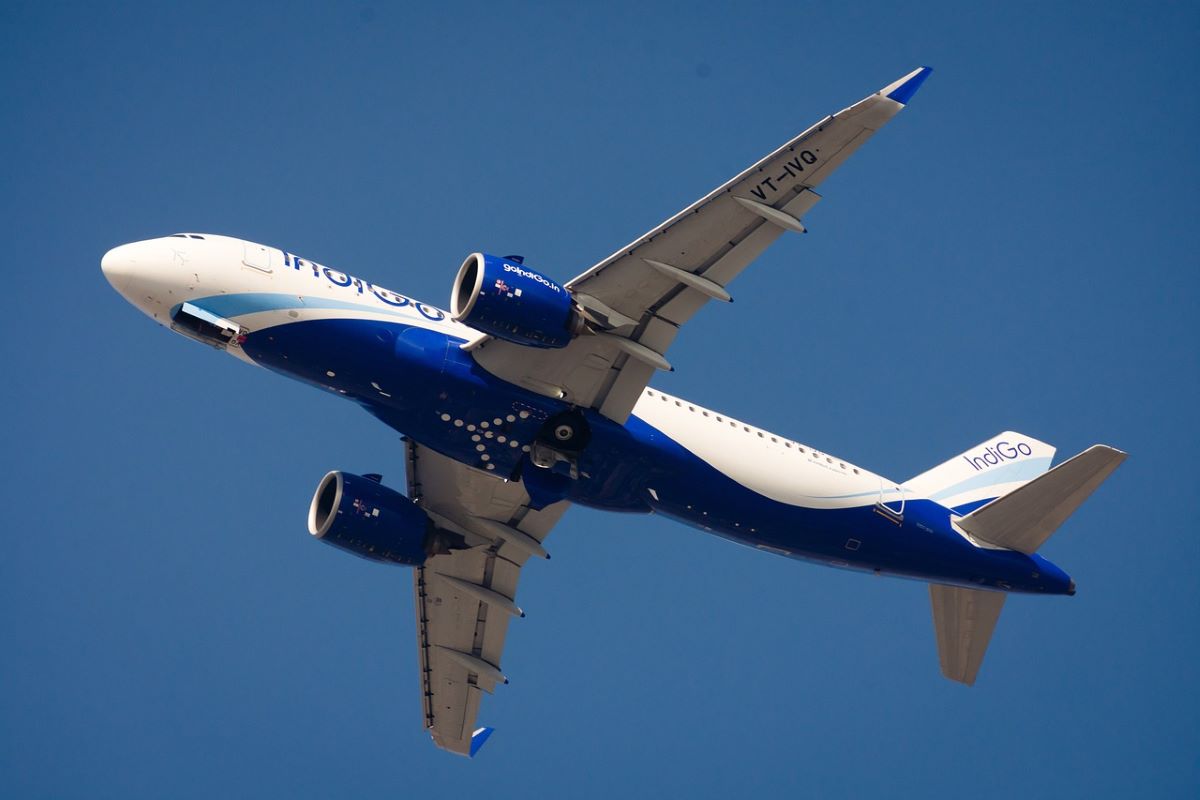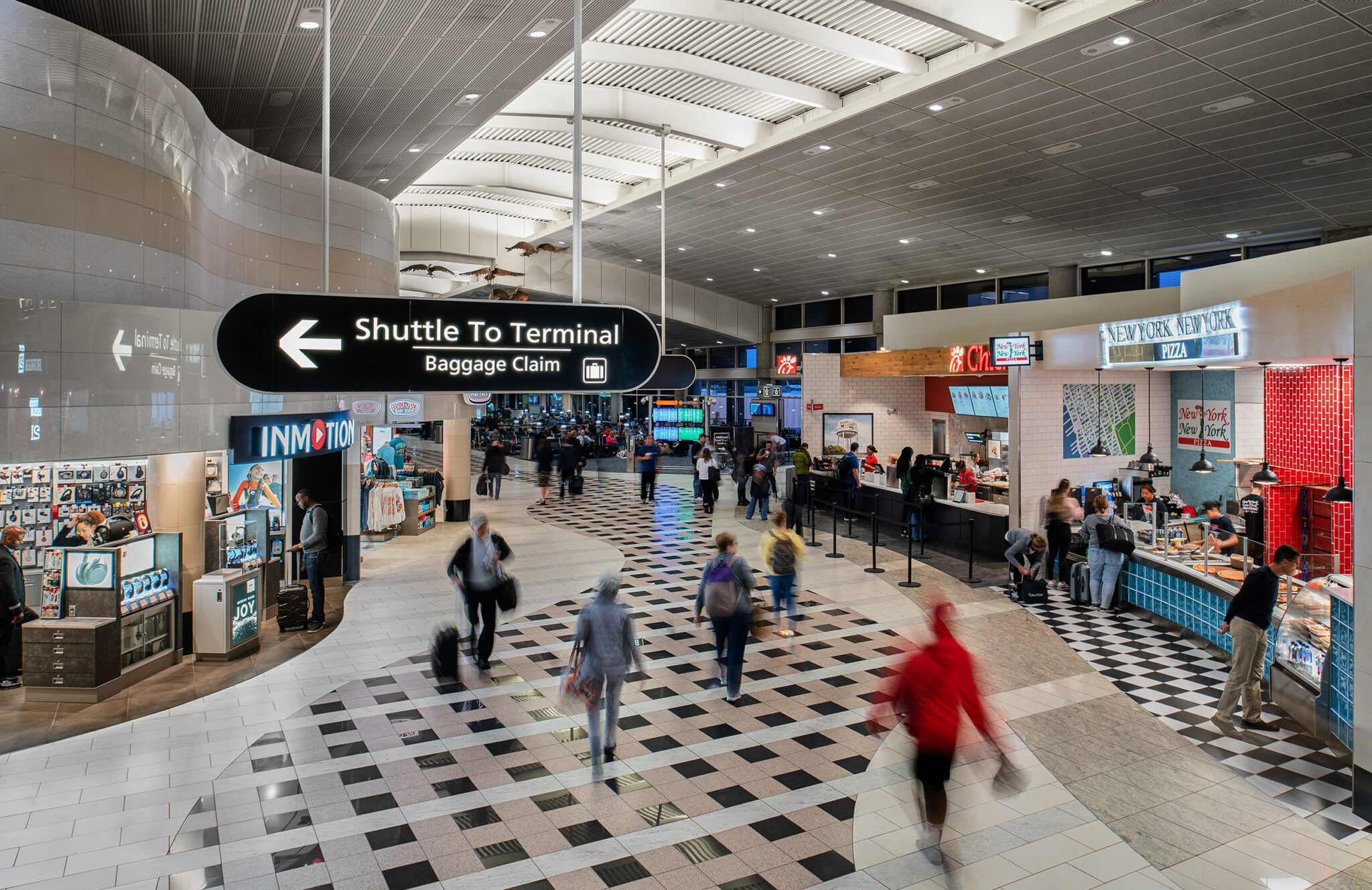Interview: Hipmunk CEO on Online Travel's Race to the Middle

Skift Take
Adam Goldstein, co-founder and CEO of four-year-old metasearch site Hipmunk, sees competitors rushing to be more like online travel agencies, and online travel agencies starting to offer metasearch results on their own search results pages.
In the context of what Goldstein calls this "race to the middle," the most successful companies will be those that "can just move the fastest," Goldstein says. "You know, who can build a booking experience and a metasearch experience, and have it work well on all devices for all verticals, in all countries, and so on."
Goldstein believes that nimble companies such as his own Hipmunk as well as HotelTonight and Gogobot, have some advantages over large public companies that need to worry about cannibalizing existing lines of business.
"If you look at the companies that have lost market share in online travel in the U.S., I think that's exactly the trap that they fell into," Goldstein says. "Successful companies are the ones that have invested in new products and new technologies and build an architecture for their company, a system, or a series of systems that enables quick experimentation using modern web technologies and mobile technologies, rather than a legacy technology system that requires a lot of upfront, top-down planning."
Skift spoke with Goldstein about these and other issues that are shaping online travel as part of our trends report The State of Travel Metasearch in 2015.
Skift: What's new in metasearch: Is the momentum of 2013 ongoing or have other things got in the way?
An edited version of the interview follows:
Adam Goldstein: As far as business models and customer preferences, it's obvious that metasearch is continuing to gain followers, traction and market share. Everyone in the travel industry seems to be moving more into a metasearch kind direction, even the online travel agencies as far as including more prominent links to other sites on their own results. Obviously, TripAdvisor is making the switch [to bookings] and continuing to add more options to their metasearch experience. In international metasearch, there are competitors that are starting to expand. It's all metasearch, all the time. That's my view.
Now, as far as the other things that are going on, there's a big shift, and this is something that we've been talking about and a couple of our competitors too. It is the shift in people who are searching and browsing and booking across different devices as part of their research and planning phase. There was big talk, probably in 2012, about how mobile was the future of travel. Yeah, I mean mobile is obviously important, but I think it's becoming apparent to everyone now that it's not just mobile, it's also tablets and it's also desktop. It's really the interplay between these things and the ability to manage the customer relationship successfully that is going to differentiate the winners from the losers.
We rolled out Hipmunk Anywhere and then a few months later Apple announced this feature called Handoff, which is basically the same idea, but just specific for Apple products. You've seen some of our competitors start to expand their offerings in this area too. I think that's the big story. It's more about customers than it is about platforms and thinking about things through a platform lens may have skewed the fact that it's actually the same people who are using your products on different devices.
Skift: You started talking about the online travel agencies adding meta features, meta links and it's meta everywhere, so how is that going to impact the meta players themselves?
Goldstein: it's something that I've been talking about. I thought that this was going to happen forever and likewise you see that some metasearch sites like us, TripAdvisor and Kayak that are starting to blur the lines a little bit in the online travel agency directiona with assisted bookings, white label bookings or whatever you want to call it. I expect that the convergence is going to continue because what drives loyalty and revenue in the travel business is providing an experience that satisfies the needs of as many different customer use-cases as possible. A pure meta doesn't really make sense, especially on mobile, because it forces people to go book somewhere else.
A pure online travel agency experience doesn't make sense because everyone knows that a lot of people are going to be searching a bunch of different sites. I think the race to the middle, if you will, it's just going to continue to play out and the people who are going to be most successful, I believe, are the ones who can just move the fastest. You know, who can build a booking experience and a metasearch experience, and have it work well on all devices for all verticals, in all countries, and so on. There are so many different dimensions on which you can win and the biggest winners are going to be the ones who do it on the most.
Skift: There's the great gold rush towards assisted bookings, as you mentioned, so it becomes harder to differentiate. Does it become a matter of just executing quicker and better, as you made reference to?
Goldstein: You're saying it's harder to differentiate for whom?
Skift: For the various metasearch players. You do Hipmunk Anywhere and Kayak does Book Kayak and then there's rush for everybody to do it and it seems like everyone is doing it or trying to do it.
Goldstein: Yeah, absolutely. Good ideas, you can't keep them down. In the travel industry there's very little defensibility inherent to these thing because they're just software and software can be copied and re-imagined. There's certain inherent advantages that some companies have that others don't, depending on what their sort of philosophical orientation is as it relates to cannibalization, so generally what you find is that, at least what I've seen, is that the bigger the company is, especially the longer that the company's been public, the more reluctant it is too risk cannibalizing its existing lines of business for new lines of business. That's because it's unproven and they may end up, at the end of it, making less than they did in the beginning.
Whereas companies that are growing quickly and are private and have less scrutiny from the public markets have the ability to experiment and tweak business models and be the pioneers of new approaches, which three years after they're proven then become the first project on the road map of the public companies. Three years is an eternity, as far as customer behavior is concerned. I mean over the last three years you've seen an incredible shift in customer behavior towards metasearch, towards mobile searching, towards cross-platform searching, so while it's true eventually everyone will catch up, there can be huge dislocations in the market in the interim.
The other thing is that a lot it comes as part of the orientation towards technology so if a company thinks of itself as a marketing company and it's job is just to sell whatever they're given by the product team, then that leads to some stagnation.
If you look at the companies that have lost market share in online travel in the U.S., I think that's exactly the trap that they fell into. Successful companies are the ones that have invested in new products and new technologies and build an architecture for their company, a system, or a series of systems that enables quick experimentation using modern web technologies and mobile technologies, rather than a legacy technology system that requires a lot of upfront, top-down planning. Those are natural advantages for startups, for us, for HotelTonight, for Gogobot. Those are the companies that have the most nimbleness and the fewest existing business lines to cannibalize.
Skift: Sure. Are you seeing any kind of pattern where the bigger metas with global coverage are making headway, vis-a-vis the regional players? Are the big getting bigger? Are the small not able to keep up?
Goldstein: For whatever reason, it feels like the dominant metasearch players in each region are the ones that originated in that region and I think there are lots of theories for this. The one that resonates the most with me is I think there really are significant differences in customer psychology, buying behavior, frequency of purchase, and all of that kind of thing that are region-specific and it just sort of makes sense that the people who come from those areas would understand those best. Once companies establish a foothold in a particular region, then they naturally try to expand elsewhere but so far it doesn't seem like any of them have been able to kick off the throne the dominant ones who are already in those regions.
It may happen, but I think most of the time it seems like the way that this happens is that it gets rolled up into a company that's essentially a holding company, whether it's Priceline or Expedia, those being the big ones. But maybe it is Alibaba or Ctrip, which are moving in that direction where they'll have international holdings that are region-specific They can experience certain benefits from being tied together, like perhaps the ability to negotiate joint contracts or share information on best practices from different regions. That model seems to be the dominate one for international.
Skift: What does the apparent dilution of hotel rate parity, including the ongoing talks in Europe, mean for the metasearch sector?
Goldstein: I think the more difference that there is between different rates and availability the stronger is the reason for customers to shop on metasearch sites. I think that it's a fairly incremental change. If you find a better price or a better option on Hipmunk that's going to stick in your mind and you're going to come back every time. Even if it only happens once in a blue moon that there's a deviation from price parity, you don't want to miss that, you want to find it. The fact of the matter is that today there are deviations from price parity all the time.
Not all of the hotels abide by their price-parity agreements, some of them don't actually have agreements that require price parity, and there are games that people play with taxes and fees. I mean there's just all sorts of reasons why you might actually see slightly or somewhat different prices even in the world where price parity reigns. That has already taught people that metasearch is important.
If price parity really disappears, then that's going to reinforce the belief that people already have that you need to search a bunch of different sites or use a metasearch site because they all think that price parity doesn't exist right now or they don't think it applies all the time, even if they don't know that term.
Skift: Are there any changes going on in the economics of participating in a metasearch site by hotels and airlines?
Goldstein: Yeah, sure. I think you're starting to see a little more experimentation with the actual transaction models and this applies both to the hotels and to the rental companies. If you look at hotels, you see online travel agencies are starting to offer customers choice between a merchant and an agency option, which is something that historically they just obscured. This always has an implication as far as the economics because of when the cash is collected, whom it is paid to, how reliably it's paid.
Then the second situation is with the vacation rental sites, you're seeing a bigger and bigger push to the notion of instant booking or instant confirmation and that again also has an implication as far as conversions are concerned.
People's likelihood of actually bothering to try to make an inquiry versus the likelihood that it succeeds does have a bearing on the relative economics of vacation rentals versus hotels and I think shift to instant bookable stuff is one of the reasons why you're seeing a lot of the OTAs starting to talk more about getting into the rental business.
Skift: Are there two or three best practices you can cite for online travel agencies, hotels and airlines that want to participate in metasearch sites?
Goldstein: There are a few big things that we see and we're not the only ones pointing this out to the suppliers or the online travel agencies, they already know this. The first one is you got to have a good high-conversion experience across all platforms. A lot of companies have been slow or late to making their mobile web experiences good and then some of them have been slow or late to making their tablet experiences and that's just leaving money on the table.
Those customers are either going to book the same inventory through a different site or they're just going to book a different piece of inventory or in the case of the last-minute booking, they may just say, "Screw it, I'm just going to just drive home instead of staying at a hotel."
The second thing is that historically a lot of suppliers and online travel agencies have been reluctant to share too much about which inventory converts the best for them. They may, for example, be unwilling to share the conversions on a particular hotel or on a particular route and instead share that information in aggregate. What you're starting to see now is that the savvier suppliers and online travel agencies are saying it's actually worth it to share more of that information with metasearch sites so that they can optimize their own offering to present the options that are most likely to convert. That's instead of obscuring that information and then it just being random luck if that happens to show up near the top of the results.
There are different ways that this stuff gets serviced, there's an implicit way to do it, you look at companies like Trivago, for example, that offer an auction dynamic, where different suppliers can offer differential bids for different properties and that's sort of leaks in the conversion rates, it also leaks in the margin and it leaks in competitive dynamics and whatever else, so it's not a pure read, but it is sort of directionally accurate. Then you've got other approaches where the OTAs just supply this information on a property by property or route by route conversion level and then that can feed into an algorithm on the metasearch site to make sure that the most relevant results are being serviced to customers.
It's obvious that the suppliers that take this approach are going to steal share away from the suppliers that don't. But it's also the case that if everyone does that, net conversions for everyone will go up. It's not like a zero sum thing; it's actually an opportunity to increase total bookings through the channel.
Then the third one, and it almost goes without saying, but it's still amazing the extent to which this comes up, is making sure that providers of inventory have fast, accurate, and reliable connections. Fast is important because at a certain point if the results haven't come back most sites are just going to cut them off.
Accuracy is important because you don't want customers to click through and get a different price or find out the availability's gone. Then reliable is important because if the connection's down, then inventory's just not going to be shown. Unfortunately I can't share names, specifically, but there are some really big companies that have issues with all three of these things and as a result they have anywhere from 10 to 30 percent fewer bookings than they would if they were getting their fair share simply as a result of their connection issues.





